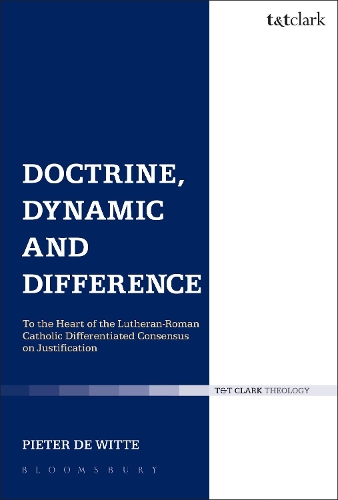
Doctrine, Dynamic and Difference: To the Heart of the Lutheran-Roman Catholic Differentiated Consensus on Justification
(Paperback)
Available Formats
Publishing Details
Doctrine, Dynamic and Difference: To the Heart of the Lutheran-Roman Catholic Differentiated Consensus on Justification
By (Author) Dr Pieter de Witte
Bloomsbury Publishing PLC
T.& T.Clark Ltd
7th November 2013
United Kingdom
Classifications
Professional and Scholarly
Non Fiction
Roman Catholicism, Roman Catholic Church
234.7
Physical Properties
Paperback
272
Width 156mm, Height 234mm
381g
Description
One of the most divisive issues in Western Christianity since the Reformation is the question of how humans are justified by God. In 1999, after many decades of ecumenical dialogue, Lutherans and Roman Catholics have declared that this issue of justification by faith' is no longer a cause of division between them. One of the fascinating features of this Joint Declaration on the Doctrine of Justification (JDDJ) is that it expresses a differentiated consensus' on justification. The method of differentiated consensus is generally regarded as an important methodological step forward in the ecumenical dialogue. It has been used and referred to in ecumenical documents published after 1999. But what are its meaning and implications This study attempts to clarify the method of differentiated consensus by (1) investigating the process of doctrinal rapprochement which led up to the JDDJ, (2) examining the way the consensus takes shape in the document itself, (3) analyzing arguments offered by critics and advocates of the official dialogue and (4) reflecting on the concept of doctrinal difference.
Reviews
'The Joint Declaration on the Doctrine of Justification is a major ecumenical agreement whose theological rationale requires rigorous exploration for the future of Lutheran-Roman Catholic dialogue. In an exemplary manner Dr. De Witte offers such an examination which will contribute significantly to the ongoing debate about the Joint Declaration. Anyone interested in the contemporary church will discover this work to be indispensable, even if not everyone will concur with all of its conclusions. It is a highly important piece of scholarship.' - William G. Rusch, Yale Divinity School, USA -- William G. Rusch
This detailed, critical treatment of the Joint Declaration on the Doctrine of Justification raises several tantalizing issues ... It stands as a major academic treatment, clearly written, of an historic agreement and an essential resource for anyone making a scholarly study and evaluation of the Joint Declaration on the Doctrine of Justification. -- Paul Avis, University of Exeter, UK * Theologische Literatrzeitung *
Author Bio
Pieter de Witte is a lecturer at the Hogeschool-Universiteit Brussel, Belgium, and a Postdoctoral Research Fellow in the Faculty of Theology and Religious Studies at KULeuven, Belgium.
